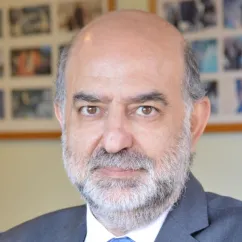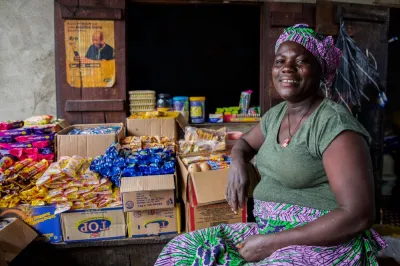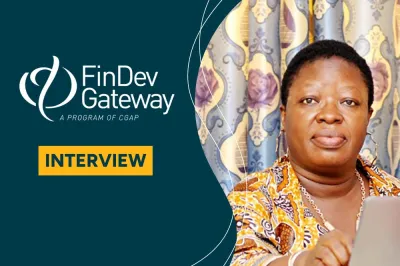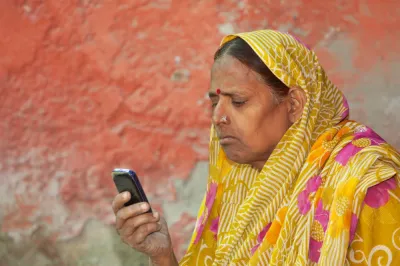In Times of Crisis, Who Holds the Lifeline for Microfinance Institutions and Their Clients?

Youssef Fawaz is Executive Director of the Lebanese microfinance institution Al Majmoua. He joined Al Majmoua as a founding board member in 1996 and became Executive Director in 2004. Youssef was a founding member of Sanabel, the regional microfinance network for the Arab world, and served two two-year terms as Chairman of the Board in 2008 and 2015. Youssef holds a doctorate in civil engineering from the University of California, Berkeley and is also a lecturer at the faculty of engineering at the American University of Beirut, where he has taught since 2001.
As Lebanon grapples with a prolonged economic crisis, the impact is starkly felt in the daily lives of its people. Families navigate unprecedented hardships, and microfinance institutions, crucial to local communities, find themselves at the forefront of these economic trials.
In this interview with Youssef Fawaz, Executive Director of Al Majmoua, a microfinance institution (MFI) in Lebanon, we delve into the realities faced by the institution and its clients amidst the current economic turbulence. The conversation illustrates the urgency of the situation and the need for support. Beyond the specific context of Lebanon, this conversation holds valuable lessons for the international development community on supporting institutions during economic crises and protecting clients, ultimately preserving the progress made in development. Youssef hopes to start a conversation about how MFIs cope during crises and the role development agencies can play to support such efforts.
Introducing the Lebanese microfinance institution and the effects of the economic crisis
FinDev Gateway: Al Majmoua is a prominent MFI that has been operating in Lebanon for over two decades. It plays an important role in promoting financial inclusion. Can you provide a brief overview of the institution?
Youssef Fawaz: Al Majmoua is one of the oldest microfinance institutions in Lebanon, established in 1998 with an initial capital of $3 million. Since our inception, we have been dedicated to serving poor and vulnerable customers, as well as microenterprises, when no one else was willing to support them. Over the years, our reach significantly expanded, and by September 2019, just a month before the crisis, we had approximately 93,000 active clients in our portfolio, with a total portfolio value of $100 million. Our organization consisted of 500 staff members and operated through 30 branches. The portfolio at risk, which measures the percentage of loans at risk of default, was around 0.8% for more than 30 days. Our total assets in September 2019 amounted to $121 million, with $67 million in equity. This equity was built over the course of 20 years through retained earnings, growth, expansion and donations.
FinDev: How has the crisis affected the institution and its clients? What are the key challenges you are facing, and how are you handling them?
Youssef: I can just say that the crisis has drastically changed how we operate. We now have only 26,000 active clients and a portfolio value of $5 million. Our total assets have plummeted from $121 million to $7 million. This rapid decline in wealth and destruction of assets is unprecedented and has had a severe impact on our institution.
It is important to note that prior to the crisis, in September 2019, Al Majmoua had $25 million deposited in local banks in Lebanon. Unfortunately, when the crisis began, the banks curtailed depositors' access to their funds. There were no laws or capital control measures in place to protect our funds. To make matters worse, the banks restricted access to deposited dollars, resulting in the devaluation of our funds. We could no longer transfer this money out of the country, nor use it internally at its true nominal value in USD. Today, the value of what remains of these bank deposits is $0.10 on the dollar, and we cannot even get them out of the bank. This devastating loss not only caught us off guard but, with the resulting downsizing and curtailing of our operations, has also pushed us back by 25 years.
The banks in Lebanon have essentially become non-functional, and there is a lack of access to financial services for those in need. However, if we receive the necessary funds, we can quickly reach 50,000 clients, as there is high demand in the market. Clients are in urgent need of support and cannot afford to wait.
FinDev: Can you explain what this means for the people working at Majmoua?
Youssef: Continuing operation has become extremely challenging. With the catastrophic loss of our assets due to devaluation, we have had to downsize the institution, shutting down 15 branches and laying off around 280 staff members, which is more than half of our workforce. We have also implemented significant salary cuts, ranging from 60 to 90 percent. Most of the managers have been living with about 10 percent of their original salary for the last three to four years. So, the crisis has had a significant impact on us as an institution and our staff.
One of the key challenges we face with downsizing is the risk of losing the progress we have made. We had departments like internal audit, full IT, risk management, HR, and a much more elaborate financial accountant and financial controller. The difficult decision now is how to downsize without losing all this progress. We want to preserve the infrastructure and avoid having to rebuild the Risk Department or the IT department, for example, which take years to build.
FinDev: What about the clients? Can you explain the current situation regarding the availability of financial services for your clients? Who is currently filling the gap for finance and serving the clients that you were serving?
Youssef: Currently, there is no one filling the gap for finance. Our clients have been left without any service, and this is a significant concern. If Al Majmoua is not able to serve them, they will have to resort to moneylenders, family or other informal borrowing networks. The banks in Lebanon have essentially become non-functional, and there is a lack of access to financial services for those in need. However, if we receive the necessary funds, we can quickly reach 50,000 clients, as there is high demand in the market. Clients are in urgent need of support and cannot afford to wait. If we fail to serve them, they will seek alternatives that come with significant costs.

Client of Al Majmoua.
How the international development community could support microfinance in crisis
FinDev: What does help mean in concrete terms?
Youssef: At this stage, Al Majmoua needs $10 million for the next two years to achieve financial sustainability. With this funding, we can continue to provide vital financial services to our clients and support their economic well-being.
Audio clip from the interview:
FinDev: What has been the response from international funders in light of the crisis?
Youssef: International investors and investment vehicles are understandably hesitant to provide additional funding in an unstable economic environment like Lebanon. We spoke to several aid agencies, and we were able to secure limited funds through a plan that the World Bank put in place after the Beirut explosion in August 2020. These funds were allocated to help SMEs and small businesses rebuild, and as an MFI, we were entrusted with vetting microentrepreneurs and providing grants to restart their businesses. In turn, we received an operating cost subsidy as an MFI, on the condition that we were financially sustainable before the crisis. This funding has helped us keep our human capital, which is our most precious asset, and by extension our ability to scale up our outreach quickly, for an additional year.
It is counterproductive for the development community to invest in an institution during stable times, only to overlook it during a crisis and then have to start from scratch again.
It is essential to recognize that the challenges we face go beyond the financial aspects. The political dynamics and the need for reforms are intertwined with the economic crisis. The international community has been trying to support the implementation of an economic recovery plan, but it has faced significant challenges. Financial support is often contingent upon the government's commitment to implementing necessary reforms. These challenges at the country level have had a profound negative impact on civil society and our MFI clients. This makes it even more crucial for the international community to stay engaged and support civil society and MFIs, as they have a direct link to the most vulnerable people in the country. Without adequate support at any level, the consequences for the vulnerable and marginalized will be severe, leading to a higher cost in the future to rebuild and restore the economic foundation.
FinDev: What is at stake in this situation?
Youssef: At stake is the preservation of established institutions with a proven track record of serving their clients for many years, even in challenging environments where others hesitate to engage. There needs to be a better international effort to protect such development investments. We must acknowledge that in certain environments, institutions, just like their clients, constantly face uncontrollable shocks. Without external interventions, we lack the capacity to manage these shocks effectively.
Advocating for the establishment of microfinance emergency funds
FinDev: The microfinance sector has seen crises like these in the past. Is there not an existing mechanism that could help microfinance institutions like yours to deal in times of crisis?
Youssef: Well, we're not the first country to face a foreign exchange crisis, bank crisis, or economic downturn. Crises like these are recurrent in the developing world. Today it may be in Mozambique, tomorrow in Zimbabwe, the following day in Bangladesh, and the year after that in Peru. Even specialists and experts in devaluation, bankruptcies and other areas are puzzled by what they see here.
I am advocating for the establishment of ... an emergency fund specifically for situations like this. These emergency relief funds would make sense if they are funded during normal years as a safety net for MFIs facing difficulties. It could potentially be funded by MFIs themselves, with a portion of their profits acting as insurance placed in a collective fund.
So, to answer your question, no, there is currently no mechanism in place. I am advocating for the establishment of such a mechanism. Ideally, there should exist an emergency fund specifically for situations like this. For example, Majmoua could access such a fund to stay in operation with $10 million this year, while an Azerbaijani MFI may need $3 million in the future, and a Peruvian MFI may require $1.5 million five years down the line. These emergency relief funds would make sense if they are funded during normal years as a safety net for MFIs facing difficulties. It could potentially be funded by MFIs themselves, with a portion of their profits acting as insurance placed in a collective fund.
This way, we wouldn't have to rush to find donors and convince them every time a crisis occurs. There would be something within the sector, understanding the needs and challenges, that could provide the necessary support to keep MFIs afloat during difficult times.
FinDev: And who do you think is in the best position to take the leadership role in establishing something like that?
Youssef: It's a complicated issue, both legally and administratively, whether it's done regionally through organizations like Sanabel or globally. It may require joint efforts. However, it is worth considering, especially when we acknowledge that these crises are cyclical and will continue to move from country to country and case to case in the developing world. We will always be prone to crises, and having a mechanism in place to support MFIs during these times is crucial.
Next steps for Al Majmoua
FinDev: Thank you for sharing with us about these challenging and complex times for Al Majmoua. To wrap up, can you talk about the next steps for Al Majmoua? What are you planning next, both in the short run and the medium term?
Youssef: Our primary focus, whether in the short, medium or long term, is to ensure the survival of Al Majmoua. We are determined to fight and mobilize every available resource to maintain the long-term viability and health of our institution, despite the challenges we face. Our goal is to remain relevant and continue being an important player in the field of microfinance.
In the short run, we are actively seeking additional support and funding to sustain our operations. We are exploring various avenues and engaging with potential donors.
In the medium term, our focus is on preserving the know-how, skills and infrastructure we have built over the past two decades. Institutions like ours have taken decades to build, and the case must be made that during times of crisis, whether it's in Lebanon, or anywhere else in the world, it is still a far better proposition to try and preserve existing institutions with a proven track record, even if it requires subsidies during the crisis years, than to try to build them from scratch after a crisis. By safeguarding our institution, we can continue serving our clients, and rapidly scale up to meet the increasing demand for financial services when economic recovery occurs. Development agencies can and should play a crucial role in making a significant difference in times of crisis.



Thank you Youssef Fawaz for sharing your thoughts on the situation of Al Majmoua and its clients in Lebanon. And for sharing ideas to prevent the collapse of years of hard work. Thoughts on the situation in Sahel and beyond were shared during the African Microfinance Week in Lomé in October 2023, echoing some of your ideas, e.g. to set guarantee funds. Testimonies including from Palestine are shared here:https://www.linkedin.com/posts/fondation-gca_t%C3%A9moignages-situation…
Let us be in touch about these issues and innovating solutions to build.
I appreciate this story and the proposed solution. There is a real need for emergency funding to get MFIs through crises like the one in Lebanon. I speak from a similar perspective in Haiti, where many MFIs have had to shrink substantially or close altogether in the past several years. Many of those institutions have been in Haiti for decades (through earthquakes, cholera outbreaks and more) and have the same strong relationship with clients and have built the strong infrastructure that Youssef speaks about. Even impact investing funds are leaving that space since they see it as too risky and that is a huge shame.
Leave a comment